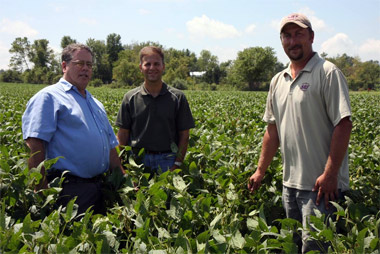
Frank Khon, Plant Health Research Lead for Monsanto, Jason Bond, professor of plant pathology at Southern Illinois University Carbondale, and Chris Vick, a soybean pathologist at SIUC, stand in a plot of soybeans at SIUC’s Agricultural Resource Center. They are part of a group of researchers testing the effects of agricultural products on soybeans, thanks to a donation made by Monsanto Co. (Photo provided) Download Photo Here
February 01, 2010
Monsanto supports plant pathology research
CARBONDALE, Ill. -- An agricultural company with a longstanding relationship with Southern Illinois University Carbondale recently made a donation to support two professors’ research in plant pathology.
Monsanto donated $104,000 to be used for research on soybean diseases under the direction of Jason Bond and Ahmad Fakhoury, professors of plant pathology in the College of Agricultural Sciences.
Monsanto Co. is a leading global provider of technology-based solutions and agricultural products that improve farm productivity and food quality. The company is focused on enabling both small and large-scale farmers to produce more from their land while conserving more of the world's natural resources.
“Monsanto’s relationship with the University has been extremely beneficial. Because of this donation, two of our top-tier professors are able to conduct research on a topic that is important to the agricultural community,” says Rickey McCurry, vice chancellor for institutional advancement and chief executive officer of the SIU Foundation. “Support such as this is vital in moving Southern forward.”
The donation stems from an ongoing research agreement between Monsanto and the University. Bond has been conducting routine research trials using the company’s products for three years through Monsanto’s grant contract office. This donation will allow Bond and Fakhoury to expand on these trials and delve further into this research.
“The money will support plant pathology research and field trials. It has helped to understand the molecular quantification of plant pathogens,” Bond says. “The funding has also allowed us to run more samples with molecular tools that give us very precise results.”
With the help of a team of students and technicians, Bond tests Monsanto’s products on soybean fields in five Illinois locations, including Carbondale, Paris, Pontiac, Tamms and Valmeyer. The research team consists of six undergraduate student workers, two graduate students and three full-time technicians.
The group has planted soybeans on two to three acres of land in each location with seed provided by Monsanto. As the research progresses, the team will begin to spray each field with the company’s products and check for diseases in the soybean plants. Fakhoury’s group will use molecular techniques to detect and quantify plant pathogens in these soybeans.
“Funding such as this is important to the University. It not only allows Dr. Bond and Dr. Fakhoury to conduct much-needed research, but it also allows students to be involved in the research process,” says Todd Winters, associate dean of the College of Agricultural Sciences. “This research will have an impact on Monsanto’s products, as well as the farmers who utilize them.”
“Monsanto saw an opportunity to assist the college in a way that would also help them achieve their goals,” Bond adds. “This was an outgrowth of the University’s relationship with the company. They saw what we are capable of doing and made an investment in us.”
